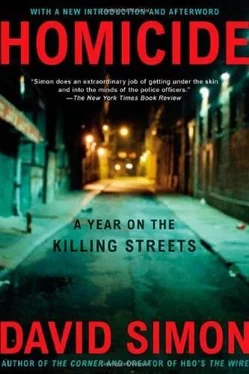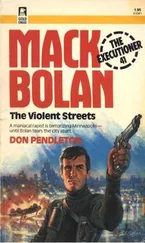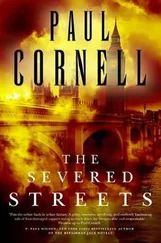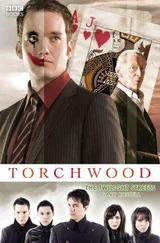Doan buries his head in his hands, contemplating the known realities. The federal budget deficit is out of control, the ozone layer is being depleted, twenty pissant countries have nuclear weapons and I, Lawrence Doan, am trapped in a small room with Rich Garvey, ten minutes away from opening arguments.
“No, I don’t need Kopera,” says Doan, regaining his calm. “I’ll need Wilson probably.”
“You want me to call him?” asks Garvey, now playful.
“Yes,” says Doan. “Yes. Please. Call him.”
“Well, Larry, if it’ll help you relax…”
Doan shoots Garvey a look.
“Don’t you look at me that way, motherfucker,” says the detective, pushing back the suit jacket to reach his waist holster and grab the butt of his gun. “I’ll shoot you full of holes right here and now and everyone in this courthouse will rule it justifiable.”
The prosecutor responds with his middle finger, and the detective lifts the gun a few inches from the holster, then laughs.
“F. Lee Doan,” says Garvey, smiling. “You better not lose this case, motherfucker.”
“Well, if you’d do your fucking job and get me some witnesses…”
The standard prosecutorial lament, heard a thousand times a day by a thousand police officers in a thousand distant courthouses.
“You’ve got witnesses,” counters Garvey. “Romaine Jackson, Sharon Henson, Vincent Booker…”
At the mention of Booker’s name, Doan gives the detective another look.
“Well,” says Garvey, shrugging, “he’s definitely a witness…”
“We’ve been through this, goddammit,” says Doan, growing irritated. “I do not want to put Vincent Booker on the witness stand. That’s the last thing I want to do.”
“Okay,” says Garvey, shrugging. “But I think you’re making a mistake.”
“Yeah,” says Doan, “I know you do. And I’m sure when we lose this case you’ll be the first one to say I told you so.”
“I sure as shit will be,” says Garvey.
The prosecutor rubs his temples, then looks down at the pile of paper on his desk that represents the state’s case against Robert Frazier in the murder of Lena Lucas. For the sake of giving Garvey grief, he has overstated the matter just a bit: The case against Frazier is solid and he does indeed have witnesses. But it is nonetheless a circumstantial prosecution, and therefore-as prosecutors enjoy pointing out-it is subject to circumstances beyond control. Without an eyeball witness or the murder weapon, without a full confession or an obvious motive, the web that connects Frazier to the death of his lover will be thin. To Garvey, who has built the case, Vincent Booker is part of that web; to avoid his testimony as a trial tactic is to weaken the case. But to Doan, Vincent Booker is a loose cannon rolling around on the deck of the ship, a witness who might be seen as an alternate suspect by the jurors.
After all, Vincent did sell Frazier’s cocaine. He knew Lena Lucas and already admitted to his knowledge of the events that preceded his father’s murder. Garvey himself believed that Vincent was probably present when Frazier demanded that old man Booker return the drugs he had taken from his son’s room. Vincent probably stood there dumbstruck as Frazier used that knife to cut his father repeatedly in the face, demanding to know where the package was. He could still have been standing there when Frazier finally used the gun. Given those probable truths, no one could say where Vincent’s trial testimony might lead.
No, thinks Doan again, the risks of Vincent Booker’s testimony are greater than the benefits, though trying to argue the point with Garvey is futile. The detective is convinced that Frazier’s attorney, Paul Polansky, will use Vincent Booker as an alternate suspect in any event. In Garvey’s view, keeping Booker in the background will only play into the opposition’s strategy.
That difference of opinion, coupled with the usual concerns about all the logistics involving evidence and witnesses, is enough to ruin whatever quiet reflection Doan had hoped for before this morning’s arguments. Instead, a detective and his prosecutor begin the day in each other’s faces.
Doan smiles, then waves his tormentor out of the cubicle for a few moments of silence. A veteran of the Baltimore courthouse, Larry Doan is short and stocky, with dark hair, pale skin, wire-rims, and an eye that wanders just enough to deny his face symmetry. In the courtroom, Doan’s appearance and demeanor often suggest a near-permanent state of woe; at times he seems to embody every stereotype about the underpaid, overworked big-city prosecutor, his briefcase crammed with motions, answers to motions and stipulations, his values crowded by the rising tide of human despair. If the Baltimore state’s attorney’s office ever needed a poster boy, Doan would be the odds-on favorite.
Among the other lawyers in the trial division, Doan’s reputation is reasonably good. He is said to be fair, reasoned and methodical with both evidence and witnesses. He preps hard for trials and his closing arguments are always competent, often skillful, though sometimes not nearly as strong or emotional as some think they could be. But in one respect, he is a rare prize for any homicide detective who happens to care about a case: Doan will fight. Assured that a defendant is guilty and that no reasonable plea can be taken, Doan isn’t afraid to take a borderline or marginal case to a jury. Like any trial lawyer, he hates to lose, but he is willing to lose if the only alternative is a stet or dismissal.
Garvey is counting on this: He knows Doan will fight, just as he knows that the evidence against Robert Frazier is sufficient but not overwhelming. Kidding aside, he’s glad to have Doan for this one.
Leaving the prosecutor’s cubicle, the detective walks down the side stairwell to the third-floor hallway outside Cliff Gordy’s courtroom. There are two benches in the hall and a third in the carpeted anteroom just outside Gordy’s court. Because he is a sequestered witness, Garvey will make the three benches his office for the next week, as a prosecution that he worked hard to prepare unfolds without him.
For Garvey, the relegation to prosecutor’s assistant is always hard to accept. Doan isn’t one of those lawyers who wants a cop to be seen and not heard; he’s willing to take advice. On the other hand, he’s going to listen to that advice, evaluate it, and then try the case his way. Garvey, who knows the Lena Lucas case better than any man, is not exactly known for his abundant tact; in fact, he’s never met an opinion he’d be unwilling to venture. Yet Doan must walk through Judge Gordy’s double doors and try the case on the merits; Garvey must sit outside and play shepherd to the state’s evidence and witnesses. The morning banter in Doan’s office suggests the change in status: In February, it was Garvey who was sweating this case, scratching for every available piece of evidence. Now Garvey has the time to joke and tease. Now he can pretend not to know whether Wilson from the crime lab is going to show up for trial. Now he can criticize the trial strategy and demand victory. Now it’s Larry Doan’s turn to carry the weight.
Yet Garvey wants very much to win this case. For one thing, he has never lost a case that has gone to a jury trial and he’d like to keep that admirable record intact. For another, he would like to see Lena Lucas avenged. She was using cocaine and helping Frazier to deal; still, she was a good enough mother to her daughters and she never hurt anyone but herself. Both of Lena’s daughters and her sister are scheduled as state’s witnesses, and all three are waiting with Garvey. The rest of the family is already inside the court, but earlier that morning, they greeted Garvey in the corridor as if he were Moses down from Sinai. Good people, thinks Garvey, settling in on the bench. They deserve to win this.
Читать дальше












